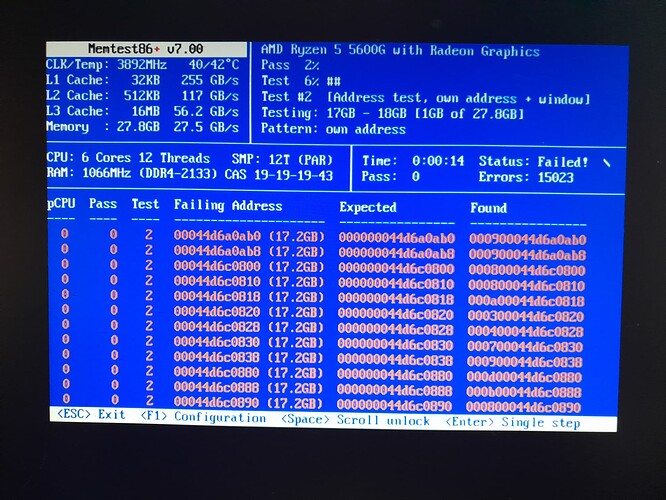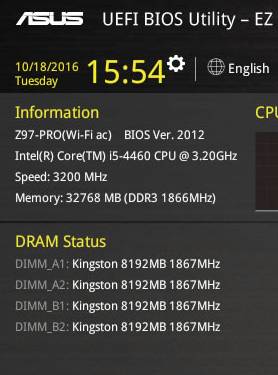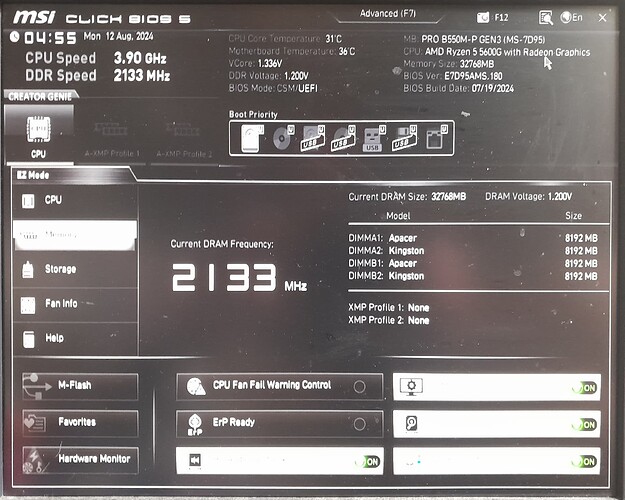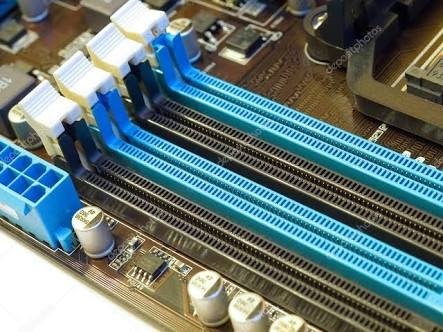Thank you very much! I haven’t been systematic enough from the beginning, unfortunately. This is what I gathered so far:
Apacer (a) has device frequency 2666 MHz
Kingston (k) has device frequency 2133 MHz
Native configuration: A1:-, A2:Apacer, B1:-, B2:Apacer; memtest OK
Curiously: A1:-, A2:Apacer, B1:-, B2:Kingston; memtest OK
A1:Apacer, A2:Apacer, B1:Kingston, B2:Kingston
won’t even reach as far as BIOS; the box hangs.
Cases where memtest fails:
One: A1:Kingston, A2:Apacer, B1:Kingston, B2:Apacer; memtest failed
Two: A1:Kingston, A2:Kingston, B1:Apacer, B2:Apacer; memtest failed
For One and Two I ran
sudo dmidecode -t memory
a1_k,a2_a,b1_k,b2_a--runs-test-failed.txt:
# dmidecode 3.6
Getting SMBIOS data from sysfs.
SMBIOS 2.8 present.
Handle 0x0011, DMI type 16, 23 bytes
Physical Memory Array
Location: System Board Or Motherboard
Use: System Memory
Error Correction Type: None
Maximum Capacity: 128 GB
Error Information Handle: 0x0010
Number Of Devices: 4
Handle 0x0018, DMI type 17, 40 bytes
Memory Device
Array Handle: 0x0011
Error Information Handle: 0x0017
Total Width: 64 bits
Data Width: 64 bits
Size: 8 GB
Form Factor: DIMM
Set: None
Locator: DIMM 0
Bank Locator: P0 CHANNEL A
Type: DDR4
Type Detail: Synchronous Unbuffered (Unregistered)
Speed: 2133 MT/s
Manufacturer: Kingston
Serial Number: 9638FF14
Asset Tag: Not Specified
Part Number: KVR21N15S8/8
Rank: 2
Configured Memory Speed: 2133 MT/s
Minimum Voltage: 1.2 V
Maximum Voltage: 1.2 V
Configured Voltage: 1.2 V
Handle 0x001B, DMI type 17, 40 bytes
Memory Device
Array Handle: 0x0011
Error Information Handle: 0x001A
Total Width: 64 bits
Data Width: 64 bits
Size: 8 GB
Form Factor: DIMM
Set: None
Locator: DIMM 1
Bank Locator: P0 CHANNEL A
Type: DDR4
Type Detail: Synchronous Unbuffered (Unregistered)
Speed: 2133 MT/s
Manufacturer: Unknown
Serial Number: 01723455
Asset Tag: Not Specified
Part Number: D12.2324WH.003
Rank: 1
Configured Memory Speed: 2133 MT/s
Minimum Voltage: 1.2 V
Maximum Voltage: 1.2 V
Configured Voltage: 1.2 V
Handle 0x001E, DMI type 17, 40 bytes
Memory Device
Array Handle: 0x0011
Error Information Handle: 0x001D
Total Width: 64 bits
Data Width: 64 bits
Size: 8 GB
Form Factor: DIMM
Set: None
Locator: DIMM 0
Bank Locator: P0 CHANNEL B
Type: DDR4
Type Detail: Synchronous Unbuffered (Unregistered)
Speed: 2133 MT/s
Manufacturer: Kingston
Serial Number: 9638FF12
Asset Tag: Not Specified
Part Number: KVR21N15S8/8
Rank: 2
Configured Memory Speed: 2133 MT/s
Minimum Voltage: 1.2 V
Maximum Voltage: 1.2 V
Configured Voltage: 1.2 V
Handle 0x0021, DMI type 17, 40 bytes
Memory Device
Array Handle: 0x0011
Error Information Handle: 0x0020
Total Width: 64 bits
Data Width: 64 bits
Size: 8 GB
Form Factor: DIMM
Set: None
Locator: DIMM 1
Bank Locator: P0 CHANNEL B
Type: DDR4
Type Detail: Synchronous Unbuffered (Unregistered)
Speed: 2133 MT/s
Manufacturer: Unknown
Serial Number: 01723455
Asset Tag: Not Specified
Part Number: D12.2324WH.003
Rank: 1
Configured Memory Speed: 2133 MT/s
Minimum Voltage: 1.2 V
Maximum Voltage: 1.2 V
Configured Voltage: 1.2 V
a1_k,a2_k,b1_a,b2_a--runs-test-failed.txt:
# dmidecode 3.6
Getting SMBIOS data from sysfs.
SMBIOS 2.8 present.
Handle 0x0011, DMI type 16, 23 bytes
Physical Memory Array
Location: System Board Or Motherboard
Use: System Memory
Error Correction Type: None
Maximum Capacity: 128 GB
Error Information Handle: 0x0010
Number Of Devices: 4
Handle 0x0018, DMI type 17, 40 bytes
Memory Device
Array Handle: 0x0011
Error Information Handle: 0x0017
Total Width: 64 bits
Data Width: 64 bits
Size: 8 GB
Form Factor: DIMM
Set: None
Locator: DIMM 0
Bank Locator: P0 CHANNEL A
Type: DDR4
Type Detail: Synchronous Unbuffered (Unregistered)
Speed: 2133 MT/s
Manufacturer: Kingston
Serial Number: 9638FF14
Asset Tag: Not Specified
Part Number: KVR21N15S8/8
Rank: 2
Configured Memory Speed: 2133 MT/s
Minimum Voltage: 1.2 V
Maximum Voltage: 1.2 V
Configured Voltage: 1.2 V
Handle 0x001B, DMI type 17, 40 bytes
Memory Device
Array Handle: 0x0011
Error Information Handle: 0x001A
Total Width: 64 bits
Data Width: 64 bits
Size: 8 GB
Form Factor: DIMM
Set: None
Locator: DIMM 1
Bank Locator: P0 CHANNEL A
Type: DDR4
Type Detail: Synchronous Unbuffered (Unregistered)
Speed: 2133 MT/s
Manufacturer: Kingston
Serial Number: 9638FF12
Asset Tag: Not Specified
Part Number: KVR21N15S8/8
Rank: 2
Configured Memory Speed: 2133 MT/s
Minimum Voltage: 1.2 V
Maximum Voltage: 1.2 V
Configured Voltage: 1.2 V
Handle 0x001E, DMI type 17, 40 bytes
Memory Device
Array Handle: 0x0011
Error Information Handle: 0x001D
Total Width: 64 bits
Data Width: 64 bits
Size: 8 GB
Form Factor: DIMM
Set: None
Locator: DIMM 0
Bank Locator: P0 CHANNEL B
Type: DDR4
Type Detail: Synchronous Unbuffered (Unregistered)
Speed: 2133 MT/s
Manufacturer: Unknown
Serial Number: 01723455
Asset Tag: Not Specified
Part Number: D12.2324WH.003
Rank: 1
Configured Memory Speed: 2133 MT/s
Minimum Voltage: 1.2 V
Maximum Voltage: 1.2 V
Configured Voltage: 1.2 V
Handle 0x0021, DMI type 17, 40 bytes
Memory Device
Array Handle: 0x0011
Error Information Handle: 0x0020
Total Width: 64 bits
Data Width: 64 bits
Size: 8 GB
Form Factor: DIMM
Set: None
Locator: DIMM 1
Bank Locator: P0 CHANNEL B
Type: DDR4
Type Detail: Synchronous Unbuffered (Unregistered)
Speed: 2133 MT/s
Manufacturer: Unknown
Serial Number: 01723455
Asset Tag: Not Specified
Part Number: D12.2324WH.003
Rank: 1
Configured Memory Speed: 2133 MT/s
Minimum Voltage: 1.2 V
Maximum Voltage: 1.2 V
Configured Voltage: 1.2 V




